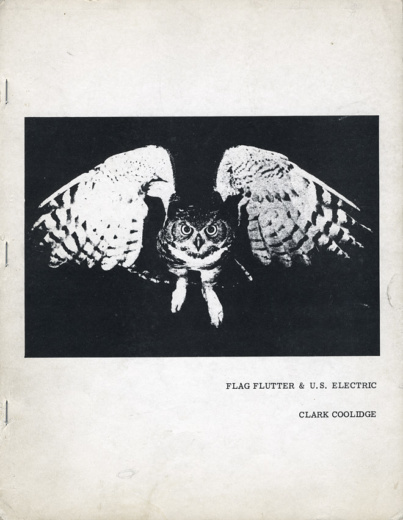
LYRIC
I'm a cardboard poet.
I eat rice.
* * * * *
a cartoon
of
energy
* * * * *
my knees are in my knees
my eyes are in my eyes
* * * * *
black salad

LYRIC
“I am a fugitive from a chain gang”
Blinded by freedom and without morals,
unable to follow orders, family
a partially digested memory,
I have left the problem known as people.
The past comes on as illness—
how we twisted together, clanked ankles
and smelled like heat. Depraved, rubbing
sand in the palms of our hands, from above
our line writhed like De Havilland’s snake pit.
Now I have become my own prisoner,
drinking from a bowl of river water,
playing with the head of an axe.
Where does kindness come from? Not here.

The Present State of My Spirit
A Proust Questionnaire Sequence
Angie Estes
Sometime during 1889 or 1890, Marcel Proust responded to a
questionnaire that was popular in France at the time. Proust titled
his responses, “Marcel Proust par lui-même” [Marcel Proust by
himself]. Some of the topics he responded to are also the titles of
the following poems:
État present de mon esprit: The present state of my spirit
Ma devise: My motto
Le principal trait de mon caractère: The principal trait of my
character
Le don de la nature que je voudrais avoir: The natural talent I
would like to have
Ce que je voudrais être: What I would like to be
Comment j’aimerais mourir: How I would like to die
La fleur que j’aime: The flower I love
Mon occupation préférée: My favorite occupation
Le pays où je désirerais vivre: The country where I would like to live
La fleur que j’aime:
They must have been Molly Bloom’s
favorites since she remembered
how the sun shines for you he said
the day we were lying among the
rhododendrons on Howth head yes,
and Virginia Woolf wrote
in late winter/early spring in
one of her last diary entries
L is doing the rhododendrons. Maybe Leonard
was planning a trip to Rhodes, island
of Rhodos, roses, or just removing
compost, bark or straw mulch,
some burlap, snow or wind screen
from around the shrubs. Perhaps he stood
out in the garden, secateurs
in hand, deadheading the most
far-reaching blossom inflorescences,
their frayed ends dangling as if
they had exploded
like firecrackers. From a distance,
it must have looked like a Greek
dance, one leg crossed over
the other, someone holding a bouquet
of air at the end of each outstretched
arm, praising what comes back
each spring, or doesn’t.

principal trait de mon caractère:
desire to see the back
side of things since
the back is the only part
of our body that we can
barely see or touch,
to taste the difference
between Burgundy wines
grown au-dessus or au-dessous. Even
in the Scuola Grande di
San Rocco in Venice, we walked
holding mirrors
in order to better see
Tintoretto’s paintings
on the ceiling. Think of how
the trunk of the paperbark
maple bursts into flames
when the sun sneaks up
behind it. Tall stones are known
as menhir in Welsh, hir
meaning long as in
hiraeth, nostalgia or longing
for home. But the backside
of nostalgia—nostos, return,
and the desire to return—
also bears algos, pain, the im-
possibility of returning. When I was
a child, I wanted to find a way
to take the blue-, pink-, and
yellow-dyed rabbits’ feet
hanging from belt loops or rear-view
mirrors and give them back
to the hopping rabbits.
And I loved the Biblical story
of the many loves
of bread, although in hindsight
I see they must have been
loaves. Remember the moment
in Le grand blond avec une chaussure
noire when Mireille Darc
greets her paramour at midnight
in a high-necked silk, black
velvet dress and then pivots
to walk away, revealing
that the dress has
no back? The moon, too,
sometimes goes black
just before slipping out
of its eclipse. In front of
the homestead where my
family lived in the Blue Ridge Mountains,
beyond trees and thickets,
an occasional upright
stone, a row of jonquils
blooms each spring. Sometimes
we cut them early and
arrange them in a vase: you love
to count the hours it takes
them to open. Now, at this
moment, when everything is
still possible, I remember you
as you will be.
Mon occupation préférée:
“I have taken delicious voyages
embarked on a word,” Balzac wrote. So I say
millefeuille, Givenchy, trois fois
de rien, while trees fly
their kite tails, the chickadee keeps
practicing its song, and I wait
at the edge of the woods like the young
brown deer in October still
remembering when it was branded
by stars because words can open
like oysters and Sometimes, very
rarely, a saying pearls forth
from their nacreous throats: we get
to decorate ourselves.*
* Francis Ponge, Le Parti pris des choses: l’huître
History
Mallarmé said that Loie Fuller, with the wing
of her skirt, created space
like the new convertible
brought home by the neighbors
on our block: at first a question mark
in the sky, then rising above them
half a parenthesis until only
a comma was left behind, the shape
of their hands as they waved
down the street. “We ought to say a feeling
of and, a feeling of if, a feeling of
but, and a feeling of by,” William James
claimed, “quite as readily as we say
a feeling of blue or a feeling
of cold,” but Leonardo’s double-helix
staircase at Château Chambord wraps
its arms around its own quiet
center, makes sure that the person going
up and the one coming down
never meet. The empty spaces, Conrad
said of maps, are the most interesting
places because they are
what will change. So was it he
who invented pinto horses, taught
the mockingbird to keep not one
but two blank patches beneath
its wings? We could hear
the car radio as they drove
away, Elvis insisting I’ll be yours
through all the years, ‘til the end of
time. From Latin cor,
for heart, to remember
in Spanish, recordar, means to pass
once more through the heart
the way the blood keeps coming
back for another tour, another
spin around the block. The yellow-
orange sash flapping past the window
was memorable, a memorial, so much
like an oriole or the scarf that keeps
circling the past’s held
note: parked by the curb, the wisteria
was all ears, a hysteria of listening.

After a row
A lapwing somersaults spring
flips over winter and back.
After a fast walk up long hills, my limbs
the engine of thought, where burn
bubbles into beck and clough to gill,
beneath a sandstone cliff balanced on a bed of shale
and held from hurtling by Scots pine
that brush a scrubby sky with cloud snow scutters,
I found a place to sit
by snapping watta smacking rocks
and wondered — how would it be for you?
And so, alone,
un-alone even, in my anger,
bring you here.
Deep Field
Photographed over ten days in December 1995 by the Hubble Space Telescope, showing the 'deepest-ever' view of the universe. He telleth the number of the stars; he calleth themall by their names: tutti-frutti, Cimabue, bracelets of Cartier, chock full o'Giotto spilled onto a black sky like Jujubes during a matinee. Anna-Eva Bergmanpainted Earth Seen from the Moon and then painted the moon—Grand rond gong in vinylique and metal leaf—as if it were the mirror she used for viewing her own paintings. In the cosmos of Dante, everyone enters deathbackwards, their past still before them, just as in some funeralprocessions there walks a saddled horse without a rider, boots reversedin the stirrups. If speech, as George Eliot claims, is but broken light upon the depth of the unspoken, then all musicplayed on the terraces of the audiences of the moon streams from the violino, the most prized salami in Lombardy—made from the haunches and shoulders of goat, deer, or chamois—shaped like a musical instrument and carved as a violin would be played: the paw graspedwith the left hand, the leg held firm beneath the chin, while in the right handa knife slides like a rosined bow. Traditionally accompanied by a Valtellina Superiore, Infernoriserva, it is eaten with a bit of Bitto cheese from the Celtic bitu, eternal, which can be kept for a very long time. The telescope showed us galaxiesso far away that their light has been traveling toward us for most of the history of the universe, even though the galaxies keep moving away, just as Augustine explained: So I can be far from glad in remembering myselfto have been glad, and far from sad when I recall my pastsadness, as in the descent into descant or chant, the Latincanere: to sing. Even now I see us on the boat leaving Venice—you facing forward, me looking back. You did not move toward me yet remained in view: your facecentered, in focus, with all of Venice receding behind you.
Revision
When the pasta is badly broken, we eat
maltagliati, and once we think
the risotto is done, we must still
make it creamy, mantecare. Because it was
never finished, Proust kept writing
in the margins of his drafts, and when
they were full, pasted small pieces of paper,
paperoles unfurling from the page as if
it had wings, could be released on parole
with a promise of words. The past, he claimed,
is hidden in some material object of which
we have no inkling, just as scientists maintain
that because a memory is altered each time
it’s recalled, the original memory is the one
we can’t know. In Michelangelo’s crosshatching
and chiseling, the two-dimensional slowly
becomes three by the same math used
in the sentence The royal We lives
in Synecdoche, New York. But since when
is a sentence ever innocent? Phoebes
still wag from the wires like words we meant
to say, and Michelangelo’s Prisoners
remain locked in stone because
we can’t remember that they were
ever free. But if we have to misremember
in order to recall, what must we do
to forget? At the end of June, cabbage leaves begin
curving in toward one another. Soon they will
bury their head in their many hands.
Cache
Here lies a hectic site, la Cité
tête-à-tête with the Seine
while Notre-Dame goes on rising
like the heel of God’s boot.
Ancient Roman isle, river
flung around it like a lavender
orchid lei around a neck: here lies
the new moon with the old moon
in her arms. Voici the sheer
leers of else, ready for hire.
We filled the room
with stargazer lilies, the scent
of a sentence when it’s ready
to speak. Relevant: the nuns folding
from relevé to grand-plié
as they touch the stones
in Saint Gervais then kiss
the tips of their fingers
while worshippers lift
their arms, saguaro cacti
lost in the dark
or longhorn cattle swaying
in the nave. Here lies
cash, lire, a sachet of sighs: pay
to the account of I’ll: yesterday,
here, hier and ici, the icy ache
of ich. You taught me
tart grammar, how to keep
thin slices of apple on edge
in crème pâtissière the way words
remain en pointe in a poem. Write
to me here: Dante@Kimosabe
The Failure of Buffalo to Levitate Millard Fillmore died here. His round body is weighted by marble angels. He lies among the great orator...